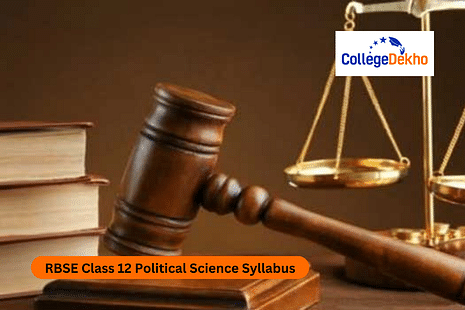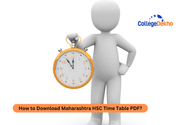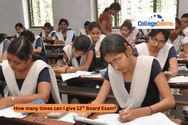- RBSE Class 12 Political Science Syllabus 2025-26
- RBSE Class 12 Political Science Syllabus 2025-26 Marking Scheme
- How to download RBSE Class 12 Political Science Syllabus 2025-26?
- RBSE Class 12 Political Science Syllabus 2025-26 - Course Structure
- RBSE Class 12 Political Science Syllabus 2025-26 Benefits
- Faqs


Never Miss an Exam Update
RBSE Class 12 Political Science Syllabus 2025-26 has been released on the official website. The syllabus is divided into 2 parts i.e. Part A - Contemporary Global Politics and Part B - Indian Politics since Independence. Each part carries 40 marks, and together they cover a total of 15 chapters. A total of 7 chapters are included in Part A and 8 in Part B. Challenges of Nation Building, The End of Bipolarity, and Politics of Planned Development are some of the high-weightage chapters included in the RBSE Class 12 Political Science syllabus for 2025-26. The 12th Political Science paper carries a total of 100 marks, out of which 80 marks are allotted to the theory exam and 20 marks to internal assessment.
When preparing for the RBSE class 12 examination, you should check all the topics along with the marking scheme to prepare a strategic preparation plan. The duration of the theory exam will be 3 hours and 15 minutes. The board will conduct the
RBSE 12th exam 2026
in March/April 2025, in pen and paper mode. Check all the details regarding political science class 12 syllabus 2025-26 rbse.
RBSE Class 12 Political Science Syllabus 2025-26
| Part | Topics |
|---|---|
| Part - A: Contemporary World-Politics | 1. The End of Bipolarity The Soviet System, Gorbachev and the Soviet Union disintegration, Disintegration of the Soviet Union, Consequences of disintegration, Shock Therapy in post-communist regimes, Consequences of shock therapy, Tension and Conflicts, India and post communist countries, India and the USSR. 2. Contemporary Centers of Power European Union, Associations of South East Asian Nations (ASEAN), the Rise of the Chinese Economy, India –China Relations, Japan, South Korea.
3. Contemporary South Asia South Asia, The Military and Democracy in Pakistan, Democracy in Bangladesh, Monarchy and Democracy in Nepal, Ethnic Conflict and Democracy in Sri lanka, India-Pakistan Conflicts, India and its other neighbours, Peace and Cooperation.
4. International Organizations Importance of International Organizations, Evolution of the UNO, Reform of the UNO after the Cold War, Reform of Structures and Process, Jurisdiction of the UNO, India and the UNO Reforms, The UNO in a Unipolar World, IMF, World Bank, WTO, IAEA, Concerning NGO – Amnesty International, Human Right Watch. 5. Security in the Contemporary World: Security, Traditional Notions: External, Traditional Notions: Internal, Traditional Security and Cooperation, Non Traditional Notions, New Sources of threats, Human rights, India's Security Strategy.
6. Environment and Natural Resources Environmental Concerns in Global Politics, The protection of Global Commons, Common but Differentiated Responsibilities, Common Property, India`s stand on Environmental Issues, Environmental Movements: One or Many, Resource Geopolitics, The Indigenous Peoples and Their Rights, Sacred Groves in India.
|
| Part -B: Politics in India Since Independence | 8. Challenges of Nation Building Challenges for the New Nation, Three Challenges, Partition: Displacement and Rehabilitation, Process of Partition, Consequences of Partition, Mahatama Gandhi’s Sacrifice, Integration of Princely States Hyderabad Princely State, Manipur Princely State, Government's Approach, Reorganisations of States, Creation of New States. 9. Era of One-Party Dominance Challenge of Building Democracy, Congress Dominance In The First Three General Elections, Nature of Congress Dominance, Emergence of Opposition Parties, Socialist Party, The Communist Party of India, Bhartiya Jana-Sangh. 10. Politics of Planned Development Political Contestation, Ideas of Devlopmemt, Planning, The Early Initiatives, The First Five Year Plan, Rapid Industrialsation, Decentralized Planning, Planning Commissionm NITI Ayog. 11. India’s External Relations International Context, The policy of Non- Alignment, Nehru’s Role, Distance From Two Camps, Afro-Asian Unity, Peace and Conflict With China, The Chinese Invasion-1962, Tibet, Wars And Peace With Pakistan, Bangladesh War-1971, Kargil Confrontation, India's Nuclear Policy, India’s Nuclear Programme. 12. Challenge to and Restoration of The Congress System Challenge of Political Succession, Fourth General Elections-1967, Electoral Verdict, Non-Congressism, Coalitions, Defection, Indira vs The Syndicate, Presidential Election-1969, Split in The Congress, The 1971 Election And Restoration of Congress, Abolition of Privy Purse. 13. The Crisis of the Democratic Order: Background to Emergency, Gujrat and Bihar Movements, Conflict with Judiciary, Declaration of Emergency, Lessons of the Emergency, Politics After Emergency, Lok Sabha Election-1977. 14. Regional Aspirations Region and Nation, Indian Approach, Areas of Tension, Jammu & Kashmir, Roots of The Problem, External and Internal Disputes, Punjab, Political Context, Cycle of Violence, Road to Peace, The North-East Demands for Autonomy, Secessionist Movements, Movements Against Outsiders, Accommodation And National Integration, Sikkim’s Merger, Goa’s Liberation, Dravidian Movement. 15. Recent Developments in Indian Politics Concept of The 1990’s, Era of Coalitions, Decline of Congress, Alliance Politics, Political Rise of other Backward Classes, The Mandal Commission, Political Fallouts, Communalism, Secularism, Democracy, Ayodhya Dispute, Demolition And After, Emergence of a New Consensus |
RBSE Class 12 Political Science Syllabus 2025-26 Marking Scheme
The syllabus is intended to provide students with a solid foundation in Political Science principles as well as the skills required to understand and analyze political events and processes. The syllabus covers various topics, from traditional political theories to contemporary political challenges. The table below consists of the detailed class 12 political science syllabus 2025-26 rbse.Part A: Contemporary World Politics
Unit | Topic Name | Sub-topics | Marks |
|---|---|---|---|
1 | The End of Bipolarity | The Soviet System, Gorbachev and the Soviet Union disintegration, Disintegration of the Soviet Union, Consequences of disintegration, Shock Therapy in post-communist regimes, Consequences of shock therapy, Tension and Conflicts, India and post-communist countries and India and the USSR. | 06 |
2 | Contemporary Centres of Power | European Union, Associations of South East Asian Nations (ASEAN), the Rise of the Chinese Economy, India-China Relations, Japan, South Korea. | 06 |
3 | Contemporary South Asia | South Asia, The Military and Democracy in Pakistan, Democracy in Bangladesh, Monarchy and Democracy in Nepal, Ethnic Conflict and Democracy in Sri Lanka, India-Pakistan conflicts, India and its other neighbours, Peace and Cooperation. | 06 |
4 | International Organizations | Importance of International Organizations, Evolution of the UNO, Reform of the UNO after the Cold War, Reform of Structures and Process, Jurisdiction of the UNO, India and the UNO Reforms, The UNO in a Unipolar World, IMF, World Bank, WTO, IAEA. Concerning NGO – Amnesty International, Human Right Watch. | 06 |
5 | Security in the Contemporary World | Security, Traditional Notions: External, Traditional Notions: Internal, Traditional Security and Cooperation, Non-Traditional Notions, New Sources of threats, Human rights, India’s Security Strategy. | 06 |
6 | Environment and Natural Resources | Environmental Concerns in Global Politics, The protection of Global Commons, Common but Differentiated Responsibilities, Common Property, India’s stand on Environmental Issues, Environmental Movement: One or Many, Resource Geopolitics, The Indigenous Peoples and Their Rights, Sacred Groves in India. | 06 |
7 | Globalisation | The Concept of Globalisation, Causes of Globalisation, Consequences of Globalisation, Political Consequences, Economic Consequences, Cultural Consequences, India and Globalisation, Resistance to Globalisation, India and Resistance to Globalisation. | 04 |
Part B: Politics in India Since Independence
8 | Challenges of Nation Building | Challenges for the New Nation, Three Challenges, Partition: Displacement and Rehabilitation, Process of Partition, Consequences of Partition, Mahatma Gandhi’s Sacrifice, Integration of Princely States Hyderabad Princely State, Manipur Princely State, Government, Demographic, Reorganisations of States, Creation of New States. | 06 |
|---|---|---|---|
9 | Era of One-Party Dominance | Challenges of building Democracy, Congress Dominance In The First Three General Elections, Nature of Congress Dominance, Emergence of Opposition Parties, Socialist Party, The Communist Party, Bharatiya Jana Sangh. | 06 |
10 | Politics of Planned Development | Political Consensus, Ideas of Development, Planning, The Early Initiatives, The First Five Year Plan, Rapid Industrialisation, Decentralized Planning, Planning Commission NITI Aayog. | 06 |
11 | India’s External Relations | International Context, The policy of Non- Alignment, Nehru’s Role, Distance From Two Camps, Diplomatic Channels, India, Peace and Conflict With China, The Chinese Invasion-1962, Tibet, Wars And Peace With Pakistan, Bangladesh War-1971, Kargil Confrontation, India’s Nuclear Policy, India’s Nuclear Programme. | 06 |
12 | Challenge to and Restoration of The Congress System | Challenge of Political Succession, Fourth General Elections-1967, Electoral Verdict, Non-Congressism, Coalitions, Defection, Indira vs The Syndicate, Presidential Election-1969, Split In The Congress, The 1971 Election And Restoration of Congress, Abolition of Privy Purse. | 06 |
13 | The Crisis of the Democratic Order | Background of Emergency, Gujarat and Bihar Movements, Conflict with Judiciary, Declaration of Emergency, Lessons of the Emergency, Politics After Emergency, Lok Sabha Election-1977. | 06 |
14 | Regional Aspirations | Region and Nation, Indian Approach, Areas of Tension Jammu & Kashmir, Roots of The Problem, External and Internal Disputes, Punjab, Political Context, Cycle of Violence, Road to Peace, The North-East Demands for Autonomy, Secessionist Movements, Movements Against Outsiders, Accommodation and National Integration, Sikkim’s Merger, Goa’s Liberation, Dravidian Movement. | 06 |
15 | Recent Developments in Indian Politics | Concept Of The 1990’s, Era of Coalitions, Decline of Congress, Alliance Politics, Political Rise of the Backward Classes, The Mandal Commission, Political Fallouts, Communalism, Secularism, Democracy, Ayodhya Dispute, Demolition And After, Emergence of a New Consensus. | 06 |
How to download RBSE Class 12 Political Science Syllabus 2025-26?
Follow the steps given here to download the RBSE 12th Political Science 2025-26 syllabus. Get the syllabus in PDF format and ensure you cover up all the topics.- Step 1: Visit the official website of the board.
- Step 2: Navigate to the home page and click on the 'अनुदेशिका 2020 एवं पाठयक्रम 2025-26’ in the left hand panel.
- Step 3: The "RBSE 12th Syllabus 2025-26" link will be displayed on the screen.
- Step 4: Click on the "RBSE 12th Political Science Syllabus 2025" link and the PDF file for all the subjects will be displayed on the screen.
- Step 5: Download the syllabus and start preparing for the board examination.
RBSE Class 12 Political Science Syllabus 2025-26 - Course Structure
Political Science is an important subject divided into two parts. You can check the marks allotted to each of the chapters through the rbse class 12 political science book pdf in hindi.Parts | Marks Allotment |
|---|---|
Contemporary World-Politics | 40 |
Politics of India Since Independence | 40 |
Total | 80 |
Also Read - RBSE Class 12 Political Science Exam Pattern 2026
RBSE Class 12 Political Science Syllabus 2025-26 Benefits
Knowing the Political Science syllabus in advance helps you to get a better understanding of the syllabus. You can prepare a schedule in advance and study accordingly. By completing the syllabus in advance, you will have time for revision, which will help you to perform better in the board exams. Let us take a look at some of the important benefits of the RBSE Class 12 Political Science syllabus.- Concept Clarity - Going through the syllabus in advance and repeated times helps you to understand the topics. With good knowledge of the topics, you can perform well in the board exams.
- Overall Knowledge - The syllabus is designed in such a way that it provides overall knowledge of the subject. The topics help you to learn new concepts, think about their pros and cons, which improves their thinking capability.
- Updated Information - The syllabus includes the latest topics that help you to gain the updated knowledge. Studying such a syllabus helps you in performing well in the future.
- Exam Stress - Knowing in advance, the amount of chapters to be covered will help you to prepare a study time table. You can dedicate the right amount of time to each of the chapters and complete the syllabus before exams.
- Time for Revision - You can plan to complete the syllabus beforehand which provides you sufficient time for revision. A quick revision helps you to attempt questions well and score good marks. Also Read - RBSE Class 12 Political Science Previous Year Question Paper
Are you feeling lost and unsure about what career path to take after completing 12th standard?
Say goodbye to confusion and hello to a bright future!

FAQs
Yes, the board will conduct an internal assessment for the RBSE Class 12 Political Science. The internal assessment will be of 20 marks and the theory exam will be of 80 marks.
RBSE Class 12 Political Science syllabus 2026 is divided into two parts.
You are suggested to study the RBSE Class 12 Political Science syllabus 2025 from day one. Going through the chapters in detail will provide in-depth knowledge and will enable you to perform well in the board exams.
When regularly preparing the topics included in the RBSE Class 12 Political Science syllabus 2026, you will find the syllabus easy. With good understanding, it becomes easy to solve all questions.
The students can check the marking scheme for the RBSE Class 12 Political Science syllabus 2026. The Cold War Era and The End of Bi polarity are the chapters with the highest marks. These should be considered important and given priority.
Was this article helpful?


















